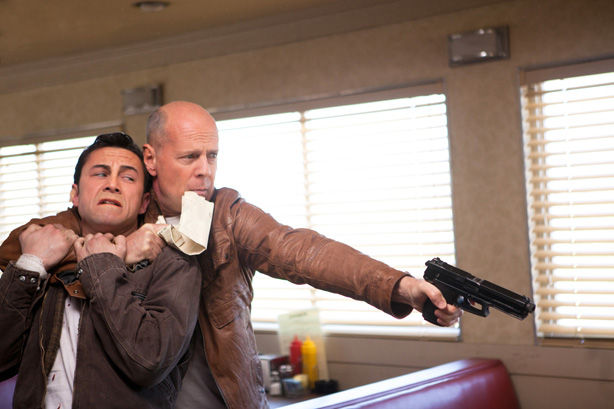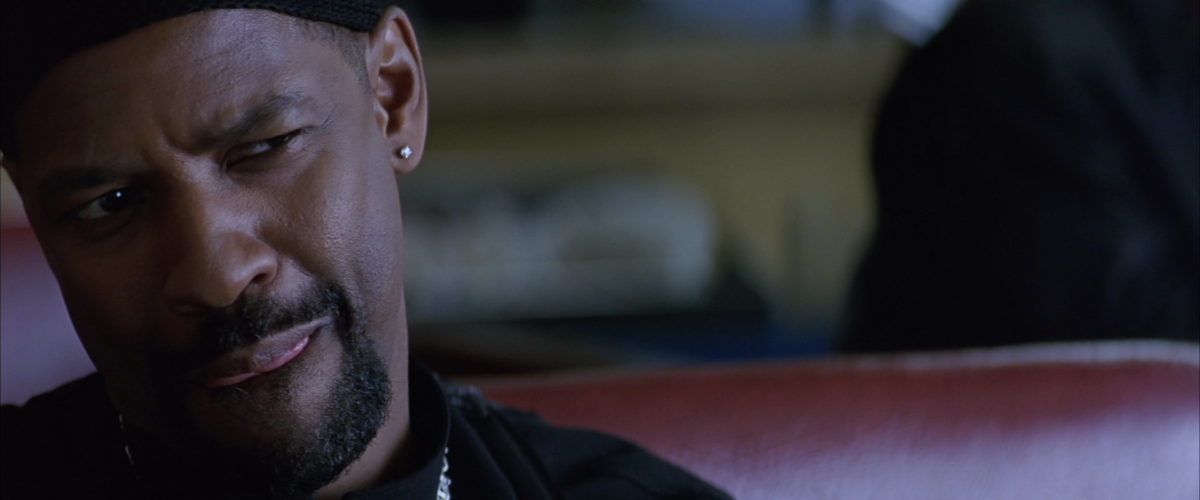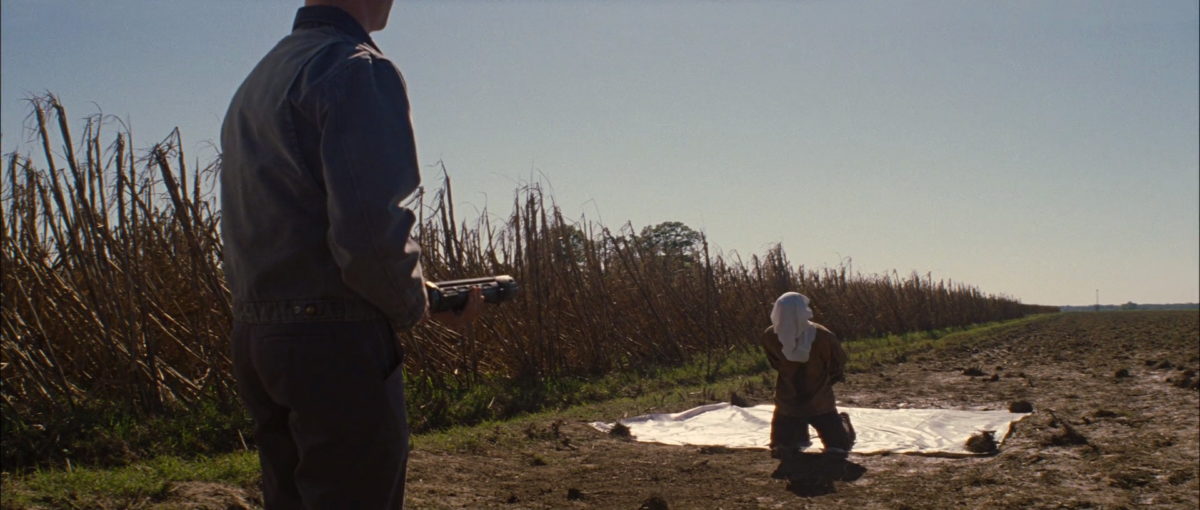
Category Archives: Gangster
Denzel Washington – Top 5 Performances
If you are a fan of the awards scene like I am you probably saw that Denzel Washington took home the Cecil B. DeMille Award for Lifetime Achievement at the Golden Globes on Sunday. I think he is very deserving of this honor and so I have narrowed down what I consider to be his top 5 performances. In each case, the title of the film is a link to Roger Ebert’s Original review of the film.
If you missed it, you can watch a great montage of his films and his acceptance speech (warning: His speech is endearing, but he is mostly rambling because he forgot his glasses).
5. Glory (1989)
Let me know if you agree with my Top 5 in the comments below. Maybe you are a big fan of Man on Fire, John Q, Philadelphia, or The Book of Eli, or maybe you think Denzel is overrated and you don’t like him at all. That is fine, you are entitled to your opinion, but I dare you to tell him to his face.
Looper (2012)
Director Rian Johnson began his career with the language-muddling high school film noir Brick, before moving on to the con-man film The Brothers Bloom, yet his third film, arguably his best, is a science fiction time-travel action film called Looper. Creating an original, but familiar location of near-future Earth, Johnson is able to place interesting characters with a complex time travel story line and let the audience go along for the ride.
Roger Ebert’s original review from 2012.
In the year 2044 time travel has not yet been invented, but thirty years later it will have been. Joe (Joseph Gordon-Levitt) is a Looper, a man hired to assassinate troublesome enemies of criminal gangs in 2074. These men are transported back in time with silver attached to their backs, are killed by the loopers and disposed of.  While it is a lucrative career, there is one downside, Loopers are expected to ‘close the loop’ by assassinating themselves. At this point they are given a huge payout and are effectively retired, left to enjoy the remaining 30 years of their life. When Joe’s future self (Bruce Willis) appears before young Joe, he hesitates to kill him, allowing him to escape and forces the younger self to track down the older self and kill him before the leader of the loopers, Abe (Jeff Daniels) finds him. The chase leads the two men to a remote farm, the home to Sara (Emily Blunt) and her son Cid (Pierce Gagnon), where they must finally sort out the ever-growing list of potential paradoxes.
While it is a lucrative career, there is one downside, Loopers are expected to ‘close the loop’ by assassinating themselves. At this point they are given a huge payout and are effectively retired, left to enjoy the remaining 30 years of their life. When Joe’s future self (Bruce Willis) appears before young Joe, he hesitates to kill him, allowing him to escape and forces the younger self to track down the older self and kill him before the leader of the loopers, Abe (Jeff Daniels) finds him. The chase leads the two men to a remote farm, the home to Sara (Emily Blunt) and her son Cid (Pierce Gagnon), where they must finally sort out the ever-growing list of potential paradoxes.
Looper as a science fiction film is innovative but thoughtful. There are nods to previous classics in the genre, and while many have compared it to The Matrix, it is actually more akin to The Terminator. There is time travel, a seemingly convoluted plot to assassinate and defend and a potentially unstoppable killer at its core. Yet Willis/Gordon-Levitt are a better pair than Schwarzenegger/Biehn and the plot allows for a neat summary at the end, to avoid any potential sequel issues. It’s nice for a modern film not to immediately play for a sequel with a cliffhanger ending and Johnson’s script is almost wipe-clean in its conclusion.
 The cast are uniformly excellent and Emily Blunt and Joseph Gordon-Levitt (with a prosthetic nose which is very convincing in the close-up shots) are as good as you would imagine. It is however, Bruce Willis who is the stand-out. It’s been a long time since Willis has had to show any range, and while he gets to show-off his action chops in a series of scenes that will delight fans of Die Hard, it is in the more emotional scenes that he excels. In fact after the barmy opening act, Looper is strongest when engaging in the depth of character on display.
The cast are uniformly excellent and Emily Blunt and Joseph Gordon-Levitt (with a prosthetic nose which is very convincing in the close-up shots) are as good as you would imagine. It is however, Bruce Willis who is the stand-out. It’s been a long time since Willis has had to show any range, and while he gets to show-off his action chops in a series of scenes that will delight fans of Die Hard, it is in the more emotional scenes that he excels. In fact after the barmy opening act, Looper is strongest when engaging in the depth of character on display.
Looper doesn’t just rest on engaging characters and dialogue though and the action scenes walk the line between slick and cool gun fights and visceral horror gore and violence. In an early scene when another old looper avoids execution, the methods used to bring him to ‘justice’ are horrific and more at home in a slasher horror. It is this edge-of-your-seat, adrenaline-fueled mayhem that gives Looper it’s edge and allows the character development to ground it, while simultaneously allowing the plot not to stall. It’s a masterful balancing act by Johnson and his team.
 Looper is an exciting, original-yet-familiar science fiction action film that is likely to become more and more popular with age. The term ‘Cult Classic’ is often applied to low-budget films that were passed by on their original runs, but Looper has all the hallmarks of a film that will transcend this status and become a sleeper classic. While a lot of science fiction films are all flashy effects and no soul, Looper bucks the trend and delivers something slick, but with a heart of emotion. Just don’t ask about the time travel paradoxes or you’ll be stuck in a diner for hours, making charts out of straws.
Looper is an exciting, original-yet-familiar science fiction action film that is likely to become more and more popular with age. The term ‘Cult Classic’ is often applied to low-budget films that were passed by on their original runs, but Looper has all the hallmarks of a film that will transcend this status and become a sleeper classic. While a lot of science fiction films are all flashy effects and no soul, Looper bucks the trend and delivers something slick, but with a heart of emotion. Just don’t ask about the time travel paradoxes or you’ll be stuck in a diner for hours, making charts out of straws.
Reservoir Dogs (1992)
At this point, the story of Quentin Tarantino has become fodder of the dreams of independent and amatuer filmmakers. Just over 20 years ago, Tarantino was working at a video store and all he had were his dreams. Now he is considered to be one of the most creative and visionary storytellers of our generation. His name has been listed along those of Scorsese, Kubrick, and Hitchcock. This is the film that started all of that. Before Pulp Fiction rocketed him to fame, Reservoir Dogs shocked and surprised audiences and critics alike. Empire magazine called it the greatest independent film of all time. It cost 1.2 million to make and doubled that in box office reciepts even though it was shown in less than 100 theaters. Tarantino has cited Stanley Kubrick’s The Killing as one of the major influences for Reservoir Dogs. Sadly, I have not seen this earlier gem. But I see many similarities between Kubrick and Tarantino. Tarantino, the fast-talking former video store clerk remains a major player. In fact, of his seven features, five are listed in the IMDb Top 250:
- Reservoir Dogs
- Jackie Brown
- Kill Bill
- Inglourious Basterds
- Django Unchained
So, what can I say about Reservoir Dogs that hasn’t already been said? Not much, but I can say it again. It’s a straightforward heist film that follows the genre’s basic format. A group of talented professionals band together for one big score. The attempt goes awry and the members turn on each other in the aftermath. There’s also a traitor, often an undercover cop, who places the others in jeopardy, willingly or not. In his debut film, Tarantino takes this model and infuses it with his now signature style and breathes life and chaos into the predictable formula.
First of all, Tarantino injects on the genre is his over-the-top dialogue, which has become more renowned because of Pulp Fiction, Jackie Brown, and his more recent projects. Reservoir Dogs opens with a lengthy conversation about the meaning of Madonna’s “Like a Virgin”, led by Tarantino himself as Mr. Brown. This type of pop-culture discussion from his characters would become a signature part of Tarantino’s movies going forward. Heist films aren’t generally known for their dialogue, so this was quite a dramatic change and widely expanded the audience for this movie. Characters mention Lee Marvin, Marlon Brando, the Thing from the Fantastic Four, The Lost Boys, and other enjoyable references. These guys may be involved in a daring crime, but they’re still people with other interests.
Secondly, Tarantino removes the normal focus of a heist film. The only scene we get of the heist is Mr. Pink (Steve Buscemi) fleeing from police after being ambushed. He recounts his escape to Mr. White (Harvey Keitel) after they gather at a vacant warehouse, which is the primary setting for the movie. By doing this, he deepens the film. The film really begins in the aftermath of the botched heist, and it’s jarring to leap right into the unknown situation. Mr. White is driving a getaway car while his cohort Mr. Orange (Tim Roth) writhes in the back seat and bleeds profusely from a gut shot. Most heist films introduce us to the characters and focus on their preparations for the big robbery. Tarantino does flash back to the time prior to the heist, but he’s not interested in their specific plans. Instead, he’s concerned with briefly setting up these professional thieves and their backgrounds.
Third, heist movies typically focus on criminals, there usually is a lead character (or a group of characters) that we identify with and want to succeed. A good example is Frank Ocean, who we follow from the start of Oceans 11, and while we meet others, we are tied to Frank and root for him and his team, even though he is a crook. In Reservoir Dogs, it’s not clear who we should root for because Tarantino scrambles the narrative. If the story was told chronologically, we’d likely connect with Tim Roth’s undercover cop, known by the alias Mr. Orange. In this structure, however, we don’t learn his identity and back story until more than an hour into the movie. By that point, we’ve grown to like Harvey Keitel’s Mr. White, especially because of his loyalty to his comrade. Steve Buscemi’s Mr. Pink is also interesting, though he’s a bit too manic and doesn’t tip. After we see the lengthy interlude of Orange’s preparations to infiltrate the gang, we feel sorry for the guy, but he’s not really our hero. Tarantino is taking a real chance by stopping the forward plot so late in the game. Watching Orange rehearse his made-up story is a classic segment, but it only works if we’re invested in the story. Tarantino trusts that we’re interested enough in this world to stick with him until the final shootout.
A fourth departure is the graphic violence, which keeps us on edge throughout the movie. Unlike gangster films, heist movies usually spend more time on the characters and plans of the heist and don’t include brutal killings. Tarantino actually moves some of the grisliest moments off-screen, but the overall nastiness remains. The prime example is Mr. Blond (Michael Madsen), who’s recently spent time in prison and has returned with a crazy streak. In the movie’s signature scene, he tortures a helpless cop, cuts off his ear, and prepares to burn him with gasoline. There’s no motive for this action beyond inflicting pain in the most vicious way possible. Strutting to the sweet sounds of “Stuck in the Middle with You” by Stealers Wheel, he delivers a frightening, yet cool depiction of a psychopath. This is not your everyday working-class thief.
The ending of the film is classic. It encapsulates the nihilism that we have seen throughout. We see loyalty and trust as well as betrayal and death. So, should everyone watch this film? Certainly not. If coarse language and violence is offensive to you, if you’ve seen other Tarantino films and been disgusted, then this won’t be for you. However, if you are a fan of gangster and heist movies or if you enjoy Tarantino’s style, you will like this first of his efforts. Tarantino injects his own unconventional style into the genre and delivers a powerful, energetic, and original film.
Do you agree with me? Am I way off on this one? Let me know in the comments below or on Twitter or Facebook.





